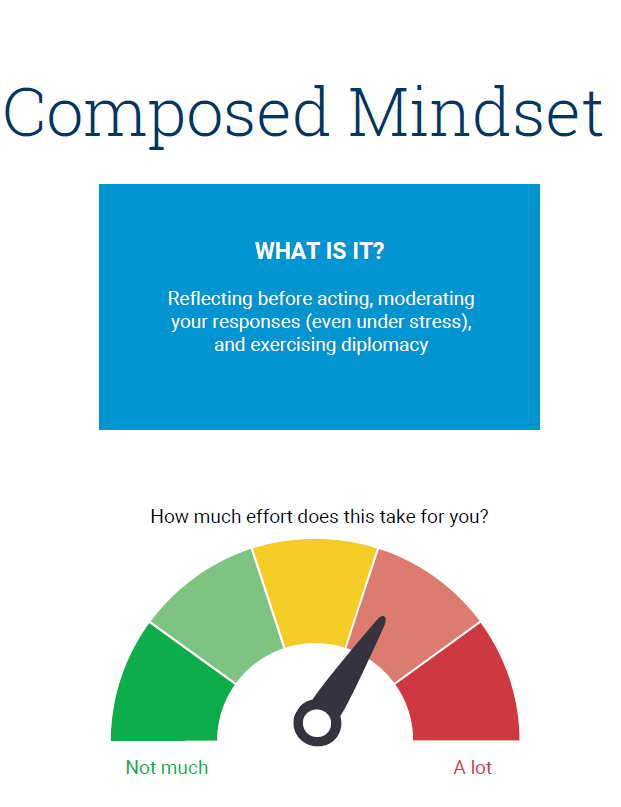We’ve often heard of the term IQ (short for “intelligence quotient”), which originally referred to a number that reflected a person’s intelligence. Over time, however, the term IQ has become broadly used as a synonym for intelligence, without necessarily implying a specific score or measurement of intelligence.
The same applies to the term EQ which is frequently used to describe emotional intelligence, without necessarily implying a measurement what the Everything DiSC Emotional Intelligence Assessment does.
Emotional intelligence refers to the ability to read the emotional and interpersonal needs of a situation and respond appropriately.
But here’s the rub, emotional intelligence (aka EQ) isn’t always at the forefront of our minds on a daily basis even though it has been shown to drive our personality and work interactions. When we have a productive conversation with a colleague for example, we don’t typically walk away thinking, “Wow, I sure was impressed with Katie’s emotional intelligence when it comes to recommending logical solutions.”
However, had this interaction gone poorly, it’s likely that we would walk away thinking something along the lines of, “Ok let’s not ask for Katie’s help again when things are going wrong…unless I want to feel like my ideas don’t make sense.”
The truth is that while we might not actively notice EQ, we definitely notice when it’s missing. Emotional Intelligence allows individuals to recognize, connect with, and learn from their own and other people’s mental states so they can adapt accordingly and why the Agile EQ DiSC Assessment was introduced.
.
Why Emotional Intelligence Matters in the Workplace
From the cold and aloof manager to the medical specialist with no bedside manner, a person’s lack of emotional intelligence can have us unsure of our interactions and their impact. It can determine whether we had a good day or a bad day when working with someone or a with a team.
Whether an in-person interaction or just through Zoom or a Teams chat, maintaining productive relationships and interactions can have strong implications on overall job performance and employee engagement.
There are a variety of different social and emotional skills that are necessary to successfully navigate personal and professional relationships. These are skills like being assertive, managing one’s temper, or showing compassion. On a human level, we all want to be understood and accepted, so when our efforts to improve our communication seem one-sided, it doesn’t feel so good.
Now more than ever organizations are recognizing the importance of strong EQ, and these types of soft skills are becoming increasingly sought after in job candidates.
The Everything DiSC Agile EQ assessment teaches professionals how to read the emotional and interpersonal needs of a situation and respond accordingly.
By combining the personalized insights of DiSC with active emotional intelligence development, participants discover an agile approach to workplace interactions and learn to navigate outside their comfort zone, empowering them to meet the demands of any situation.
In a half-day training, participants will discover their EQ strengths, recognize their EQ potential, and commit to customized strategies for building agility. The result is an emotionally intelligent workforce that can support your thriving agile culture.
Benefits of the Everything DiSC Emotional Intelligence Assessment
In a personalized, 26-page profile you learn about the instinctive mindsets that shape your workplace responses and interactions, recognize opportunities to stretch beyond what comes naturally to you, and gain actionable strategies to become more agile in your approach to social and emotional situations. The profile may be used on its own or with the companion facilitation.
To download a sample of the Everything DiSC Emotional Intelligence Assessment, click here.
Having a pulse on your Emotional Intelligence and how agile you are helps you become aware of your ability to “stretch.” If you can stretch beyond your comfort zone to control and adapt your knee-jerk default response triggers, you’ll become better at navigating different workplace challenges and interactions.
The 8 DiSC Emotional Intelligence Mindsets
DiSC helps us see patterns in how we perceive and approach different situations otherwise known as “mindsets.” A mindset describes the way you tend to think about interactions and approach them. It’s also your natural response for solving a social or emotionally driven problem.
The 8 DiSC Mindsets are:
- Self-Assured: projecting confidence and taking charge
- Dynamic: influencing others and taking action on new ideas
- Outgoing: building up relationships and expressing unfiltered thoughts
- Empathizing: understanding others and reaching out to be supportive
- Receptive: keeping an open mind and considering other perspectives
- Composed: appearing calm and diplomatic
- Objective: thinking rationally and clearly
- Resolute: resisting pressure to cave in
If for example, a person was shown to have the Dynamic mindset after taking the assessment, then they can possibly lean into looking for more opportunities to be an advocate for colleagues or teammates, helping other people learn how to sell their ideas.
Likewise, a person with the Receptive mindset could help establish ground rules for respectful discussions on their team, talking about the benefits of keeping an open mind and sharing different ideas.
The Agile EQ model value-add is that with practice, persistence, and the right resources, agility can be developed by anyone—even that aloof boss or the brusque doctor.
In today’s fast-changing work environment, it’s essential for employees (including managers) to have the skills to adapt in changing situations and thrive in an agile culture.
Contact us today to learn more about Everything DiSC Emotional Intelligence Assessments or training.

